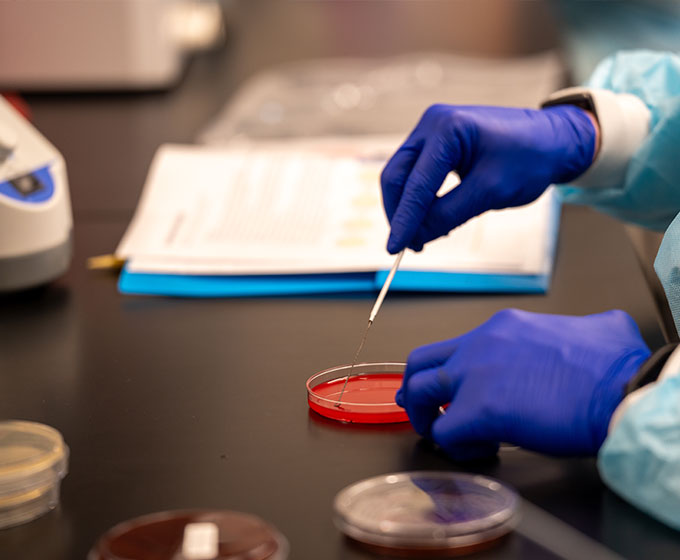
FEBRUARY 10, 2025 — Undergraduates at UTSA are tackling the growing antibiotic resistance crisis as part of a microbiology course studying soil samples.
The U.S. Centers for Disease Control and Prevention describes antimicrobial resistance as “one of the world's most urgent public health problems.” It occurs as pathogens develop defense mechanisms against common antibiotic medications.
According to the World Health Organization, the process is driven by misuse and overuse of antibiotic drugs. Meanwhile, the development of new, more effective antibiotics has not kept pace with rising resistance levels, leaving a growing number of bacterial infections untreatable.
A recently developed interdisciplinary project called Place-Based Soil Data Interpretation and Research in Texas (PBS-DIRT), funded by a $395,000 grant from the U.S. Department of Agriculture, is providing UTSA students the opportunity to help find solutions.
“Over 60% of clinically used antibiotics come from soil bacteria, but as soil erodes, so does the opportunity to discover new antibiotics,” said Sara Shields-Menard, assistant professor of instruction of molecular microbiology and immunology. “Soil also contains microbes that influence environmental and human health. Research can reveal ways to prevent the spread of harmful pathogens or monitoring environmental conditions.”
Students participating in the module are collecting soil samples in the San Antonio area and analyzing soil data to potentially find new antibiotics. They will contribute their findings to a global database managed by the Tiny Earth Initiative, an organization that supports student research in pursuit of more effective antibiotics.
“I realized how much there is left to understand,” said Elizabeth Negron, UTSA microbiology and immunology student. “I think being able to understand pathogens before they become pandemics is very significant, and that’s something I’d like to be part of personally.”
So far, UTSA students have isolated bacteria with interesting pigments and found that certain soil bacteria can slow or prevent the growth of bacteria that are tough to treat.
UTSA Today is produced by University Communications and Marketing, the official news source of The University of Texas at San Antonio. Send your feedback to news@utsa.edu. Keep up-to-date on UTSA news by visiting UTSA Today. Connect with UTSA online at Facebook, Twitter, Youtube and Instagram.
Move In To COLFA is strongly recommended for new students in COLFA. It gives you the chance to learn about the Student Success Center, campus resources and meet new friends!
Academic Classroom: Lecture Hall (MH 2.01.10,) McKinney Humanities BldgWe invite you to join us for Birds Up! Downtown, an exciting welcome back event designed to connect students with the different departments at the Downtown Campus. Students will have the opportunity to learn about some of the departments on campus, gain access to different resources, and collect some giveaways!
Bill Miller PlazaCome and celebrate this year's homecoming at the Downtown Campus with food, games, giveaways, music, and more. We look forward to seeing your Roadrunner Spirit!
Bill Miller PlazaThe University of Texas at San Antonio is dedicated to the advancement of knowledge through research and discovery, teaching and learning, community engagement and public service. As an institution of access and excellence, UTSA embraces multicultural traditions and serves as a center for intellectual and creative resources as well as a catalyst for socioeconomic development and the commercialization of intellectual property - for Texas, the nation and the world.
To be a premier public research university, providing access to educational excellence and preparing citizen leaders for the global environment.
We encourage an environment of dialogue and discovery, where integrity, excellence, respect, collaboration and innovation are fostered.